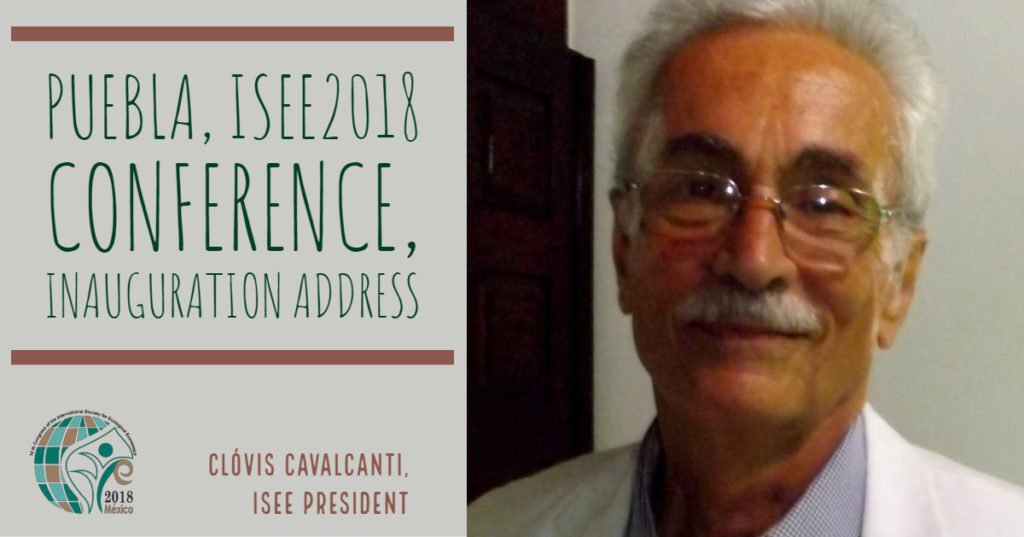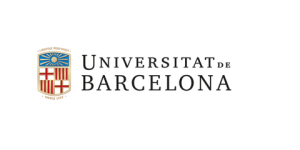
Puebla, ISEE2018 Conference, Inauguration Address
Clóvis Cavalcanti, ISEE President
Dear friends,
With great honor and joy, I ask your permission and the organizers’, in the name of their coordinator, my old friend David Barkin, to offer you a few words of greeting.
First of all, I want to thank you for giving me the enormous privilege of presiding over the International Society for Ecological Economics (ISEE) in 2018-2019. Our great moment during my tenure is exactly now, when we meet in this, the fifteenth biennial conference of ISEE. David and his formidable group of collaborators, whom I came to appreciate very warmly since coming to the UAM Xochimilco campus in October 2017 to participate in the preparations for our reunion, are creditors of our recognition and tribute for the work they have done. The task was not easy, especially because of the great limitation of resources which had to be overcome in the running of the event. Fortunately, the Autonomous University of Mexico (UAM) and the Benemérita Autonomous University of Puebla (BUAP) provided the minimum support base that the Organizing Committee needed to carry out its mission. This base was used by the Committee with mastery. It thus deserves all our appreciation – mine, especially.
Thank you, David. Thank you, María Luisa. Thank you, all other members of the Committee. And many thanks also to Anne Carter, admirable ISEE executive secretary, who cloned herself in Boston so that nothing was lacking in our headquarters’ support for the ISEE2018 meeting. I could not omit many thanks as well to the members of the Board – Bernardo Aguilar, David Barkin, Eva Cudlinova, Jasper Kenter, Madhavi Venkatesan, Peter May, Richard B. Howarth, Tatiana Kluvánková and Volker Mauerhofer – who have done what they could for the success of all our ISEE activities.
By the way, to pronounce the acronym of our Society in English, I prefer the solution adopted in Brazil, not to spell, but to express acronyms, always, as a word. In our case, ISEE would be in English “I see”. I like this coincidence. Seeing, perceiving reality as it is, on a holistic fashion, is the task of our society, founded by scholars who were against ignoring the ecological dimension in economic processes.
When I decided to stop being a conventional economist in the manner of Paul Samuelson, Robert Solow, George Stigler, and so on, and follow the guidance of Nicholas Georgescu-Roegen, I was convinced of the wisdom of the latter’s proposal for introducing thermodynamics in the economic approach by changing the understanding of the field he used to call “ordinary economics.” I was fortunate to hear Georgescu in Rio when I was 23 and an admirer of neoclassical theory. Some years later, I met Herman Daly and then my adherence to the entropic vision of the economic process was completed. I consider myself a post-economist. Ecological economics is for me the ecological view of the economy, against the economic view of the economy of neoclassical and Keynesian economics. The economic view of nature, in turn, is the perspective of the environmental economist.
Early on in my work as an ecological economist, I joined the strong sustainability group and assumed the steady-state economy model. Later, being in permanent touch with Joan Martínez Alier since Washington, DC, in May 1990, I also realized that our commitment is to work with the notion of the incommensurability of values, socio-environmental conflicts and injustice, different languages of valuation – issues of political ecology which David Barkin has helped me to understand better. In 1964-1965, David and I were roommates in New Haven, studying at Yale, along with a colleague of mine from Rio, Edmar Bacha, who became a prominent Brazilian Neoclassical economist. I visited David in 1970 in New York, where he was a professor at the City University of New York. Staying in his Greenwich apartment, he soon let me know that he had become a radical economist. He also warned me to be careful when using his telephone line because he was being followed by the FBI and his phone was tapped. To my delight, he told of his approximation to Cuba and friendship with Che Guevara.
With these references, I cannot be a “light” ecological economist. This is one reason why I would like the ISEE to become a scientific society committed to promoting the art of life, good living (“buen vivir”), happiness, social equity, studying how to achieve that much with a minimal ecological footprint. I would like thus to propose that we be more militant. May we have the courage to take on values such as those exposed by the papal encyclical Laudato Si’, and like those adopted in the philosophy of GNH (gross national happiness), introduced in the Kingdom of Bhutan from 1972 on. With a view to these commitments, I have sought an involvement with the encyclical Laudato Si’, whose ecological-economics credentials seem to be straightforward. In this context, on behalf of ISEE and with the agreement of the Board, I have approached the Roman Pontiff and the Holy See in order to show how close we are in terms of the proper use of Nature for the promotion of human well-being. To this end, I met Pope Francis in Rome on Nov. 23rd 2016, together with Stuart Scott, a member of ISEE and a pro bonno strategic consultant to the Board (my wife, Vera, accompanied us).
Hence why I consider the theme of this ISEE conference – “Ecological Economics and Socio-ecological Movements: Science, policy and challenges to global processes in a troubled world” – very appropriate for what I am proposing now. In this sense, I agree with David Barkin’s view that a deeper and more radical epistemological and ethical rupture is required of ecological economics with the premises of Neoclassical economic rationality.
It helps that David Suzuki, with whom I went to Bhutan in January 2013, has said that, “As top predator, our species remains dependent on clean air, water and soil and biodiversity, making our ability to survive catastrophic planetary disruption questionable.” This is a perception we catch also from the Global Footprint Network’s calculations leading us to the conclusion that there must be a demarcation of the commitment ecological economists must make to the sustainability of life on the planet. In 2003, in Havana, at the III Latin American and Caribbean Conference of Social Sciences, of CLACSO, I heard from Fidel Castro at the closing of the meeting that such reunions would not be feasible in the future if we did not take care of the health of the planetary ecosystem. Something similar, I heard from Evo Morales in October 2009 in Cochabamba, when the Bolivian president opened the V Conference of the same series of CLACSO. Morales said: “The rights of the Earth come before human rights.”
The challenges are clear. Our world has moved into an increasingly frightening picture of unsustainability. The collapse of the Genoa bridge, Italy, in August, indicates this sense of unsustainability. Something can happen suddenly in complex socio-ecological systems, totally beyond our imagination. The commitment of ecological economists is with sustainable bridges, sustainable health, sustainable human well-being, broad equity, and the prudent use of life-support systems. It is as the title of a book of our colleague in ISEE, Brian Czech, a former student of Herman Daly, says: our situation is like that of “shoveling fuel for a runaway train”. This will end badly one day as the ongoing process is unsustainable.
I hope and wish that we can leave Puebla at the end of this conference assured of our historical responsibilities as ecological economists, rejecting any image that we are a branch of economics. No, our field of work is that of a revolutionary, post-normal, dialectical science, committed to the supreme value of life, with equality, efficiency and sustainability.
Thank you all for coming to this land of so much telluric strength, the cradle of corn and vanilla, a land of great indigenous heroes, of Frida Kahlo, Diego Rivera and so many artists. A land chosen by the Virgin Mary to appear in Guadalupe, brown-skinned and with mestizo traits, to the Indian Juan Diego Cuauhtlatoazin, in 1531, speaking with him in his native language, Nahuatl.
May I repeat the words of my speech at the opening of the 12th ISEE meeting in Rio in June 2012. Our affection for humanity should lead us to think about improving the human condition. This is the task I conceive for ecological economics following the diagnosis of Alfred North Whitehead that we are here, first, to live, second, to live well, and, thirdly, to live better. We are not here to own more and more gadgets – some plainly stupid.
We do not want to see our world collapsing like that fateful bridge in Genoa. We love life. We want to preserve Nature for our descendants. This takes us to affection as the basis of sustainability and of ISEE. In 2012, Herman Daly sent me an instructive text of a lecture that Wendell Berry, a sensitive American poet, essayist, novelist, and farmer (I also own an organic farm), gave in April that year at the National Endowment for Humanities in Washington, DC. In it he says that “it is in affection that we find the possibility of a neighbourly, kind, and conserving economy.”
The concept of sustainability requires, according to Berry that “the fertility cycle of birth, growth, maturity, death, and decay … should turn continuously in place … so that nothing is wasted”. Berry explains that “For this to happen in the stewardship of humans, there must be a cultural cycle in harmony with the fertility cycle”. The cultural cycle would then be what is meant by sustainability. Berry concludes: “The fertility cycle turns by the law of Nature. The cultural cycle turns on affection.”
I would like to thank here the work of all the presidents of ISEE who have been at its helm before me, giving their best to build an organization that promotes our ideal of sustainability, justice and efficiency. Thanks, Bob Costanza, Dick Norgaard, John Proops, Charles Perrings, Joan Martinez Alier, Peter May, John Gowdy, Bina Agarwal, Marina Fischer-Kowalski, and Sabine O’Hara. I wish the president-elect, Josh Farley – my friend since we met at Herman Daly’s house two days before 9/11, and almost a neighbour in Olinda, my home town, where his father-in-law lives – a fruitful job towards more activism and more activities that leave smaller ecological footprints as strong features of ISEE.
This way, let us thus make ISEE a humane enterprise revolving around affection. Have a very good conference. Thank you! ¡Gracias!


